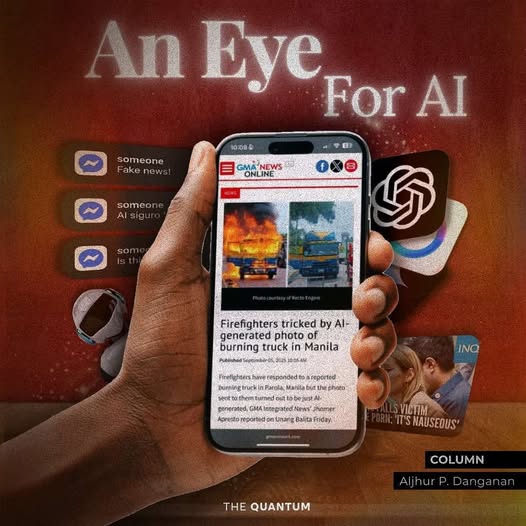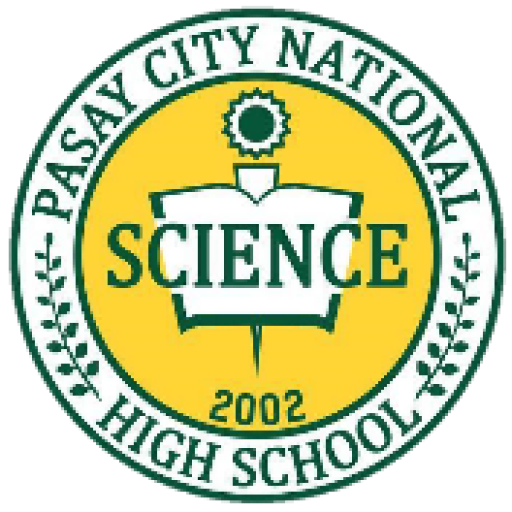by: Aljhur P. Danganan
Copyedited by: Ayesha Ronquillo, Estella Talua
Publication by: Marthiena Veniezha Atienza

Artificial intelligence has long embedded itself in our society—applied in fields, industries, and communications, becoming a common place in routine lives. The problem, however, is when we are living amid an era where AI fuels misinformation, the truth relies on our ability to be literate—a standard that too often falls short.
Scrolling through social media can feel tiresome, especially when confronted with uninspired, AI-generated videos. Yet the danger escalates when these same tools are weaponized to spread misinformation. What is most alarming is not the presence of such content—it is the overwhelmingly large number of people who fail to see its deceptions.
When an AI-manipulated photo of a trailer truck caught on fire in Manila spread online, the response of four fire trucks from the Manila International Container Terminal was rendered useless. If a fake image produced in presumably mere seconds was able to deceive the public, what more if these tactics are wielded for far graver purposes? From digital smear campaigns, deepfakes, to automated texts and generative media disguised as convenience, the media landscape is plagued with distrust and deception.
This constant exposure has posed the greatest threat: one’s inability to discern what is real. Casual remarks like “Is this AI?” and “AI siguro ‘yan” seem harmless on the surface, but they reveal a deeper, dangerous crisis—people conditioned to consume media irrationally.
Yet another frustrating byproduct of this issue lies in the baseless accusations thrown at any work deemed “too perfect.” A rather impressive digital artwork will not be spared from being labeled as AI. In another case, you would be one em dash away from dealing with the same situation.
Actress Angel Aquino denounced the use of AI to violate women’s rights in a senate hearing last Thursday after falling victim to deepfake pornography. In a tech-driven age, the dehumanization of human rights, especially with women, have become far more alarming. Aquino rightly urged the committee to punish cyber perpetrators and seek legislation of stronger laws regarding the proliferation of deepfakes.
On the other hand, shaming people who fall victim to AI-driven misinformation will not solve anything. Media literacy may not be dead, but it remains in a fragile state. When the masses are being exposed to the threats of AI, it is only right that they are equipped with separating facts from falsehoods. Likewise, they must be able to approach any piece of media in more than just a superficial way.
Adapting to the digital era will always require one thing: literacy. Literacy is not exclusive to reading and writing, nor is it confined to academics. It is our ability to analyze, question, and navigate lifelong information that is crucial in shaping the world. It is the foundation of societal progress.
AI and media literacy, specifically, have become a need for our digitally divided civilization. In the Philippines, the adoption of AI tools and partnerships for literacy development have begun to take shape. Albeit, the education system still falls short in offering specific disciplines or courses focused on understanding AI itself.
What truly matters is equipping people to grasp how intelligent systems work. Because the problem is not AI itself. The deeper issue lies in how we utilize it ethically. When people grow accustomed to irresponsibly using AI, you get the worst of both worlds: the loss of genuine human effort, and the spread of its abuse meant to manipulate the masses.
If our only course of action is to hold AI responsible, then we are fundamentally failing to grasp the issue at hand. AI bears no liability for misinformation—it is merely a tool, one that happens to be accessible for its perpetrators. Perhaps, the crux of the matter is not AI itself, but the people. False news has always been a product of human schemes, AI only makes it harder to recognize.
To fight against misinformation is to advance media literacy with AI. To be literate is to engage with information with purpose, provided with awareness, education, and tools that will mold a literate society towards truth. The pursuit of truth will only crumble when AI remains unchecked, left in the hands of the culprits.
Because no matter how advanced misinformation can get, a well-informed and resilient public is the strongest defense against manipulation. It is only through being adept and competent that we can empower ourselves to verify information we encounter, enter the digital world with no fear of deception, and navigate the media landscape with one mindset: that no amount of generative exploits must overwrite the truth.
Only then can we truly say that we are not just passive consumers of media, but conscious truth-bearers, ready to bring what’s real to light in a world riddled with illusions.



